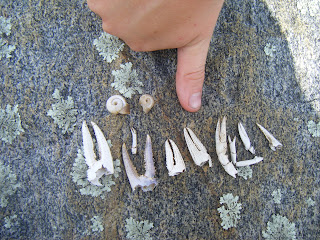My oldest son attends a Sr. Public school, which means that there are only grade 7 and 8 classes there. In his first year, there was a grand total of one day of outdoor education. It was part of a science unit about food chains. On that day, the kids were piled into school buses and driven to a dedicated outdoor centre about 20 minutes away. It was a beautiful location, but the species we saw (I volunteered as a parent) could all be found within a 10-15 minute walk from the school. In grade 8, the was no trip; there was absolutely no outdoor education at all.
Now, this school has also won some environmental awards, mainly based on the efforts of a group of students to maximize recycling and composting during nutrition breaks. Some students have also worked to try and get some trees planted on the barren property, and others have suggested plans to build an outdoor classroom in the future. Would this classroom be used, were it to be built? Would demand slacken once the weather turned cold? What about kids who don't have adequate winter clothing, how could they take advantage of such an opportunity? Who would maintain it? How could it be used best?
Kids who play and learn outside tend to be calmer, more physically fit, and are less likely to be deficient in vitamin D.
When the teachers do not see the connections between nature and the subjects they teach, then they are unable to help the students make these connections. When the students rarely experience nature, they are not likely to make these connections on their own either.
In a world threatened by climate change, alarming rates of species loss, vast deforestation, explosive human population, ocean acidification, food security issues, and lack of clean water (more people have access to a cell phone than to a toilet), the lack of connection we have with nature is downright terrifying.
I could start quoting Richard Louv, but it would be much better if you were to read his books. The point I am making here is that our very educational system is missing one of the most crucial fields of study and our society is suffering as a result.
The sad fact is that children are better able to name brand logos than they are to name or in other ways identify plant and animal species found in their own back yard. Kids may go years without ever seeing any wild nature at all, let alone learn how to relate to it, understand it and learn from it. This reflects our obsession with things instead of life and place. Is this really the value system we want to pass on to our children?
I am fortunate to live in an urban area with easy access to natural areas. Yet the kids of neighbouring families still do not use these places, for reasons I can only guess at--safety, over-scheduling, or maybe because they fail to see the value in these places.
When we pare down our needs to the basics: food, clean water, clean air, shelter, and some might argue, companionship, it becomes clear that we are a part of the natural world. The rest is just static that we've created along the way. We are a busy, restless species, and this static can help us sometimes, but it is not a need, and it often gets in the way of our understanding of our place within the larger natural system.
 |
Do you remember that kid who never wore a coat when it was cold out, who spent more time outside than in, played outside even in the rain, and was daring enough to even sample the mud pies (you know, way back when kids actually used to make mud pies)? Do you remember how the adults used to say that he'd catch his death of cold etc., yet he never got sick? There are reasons for this that we are only now beginning to understand.
Last autumn my family and I went on a canoe trip down the Obabika River in Temagami (Ontario). This trip was a couple of days longer than our usual trip, there was rain through part of it, and a creek with what we called "quickmud" rather than water. We became wet, and slogged harder and further than on previous trips. When we returned home, we found the house unbearably warm, despite the fact that the thermostat read 18 C. During the trip our bodies had acclimatized to the weather without our noticing. This is something we don't often allow to happen, at least not in the western world, and yet it could be so very useful. I have to wonder, what other natural qualities have we lost along the way?


No comments:
Post a Comment